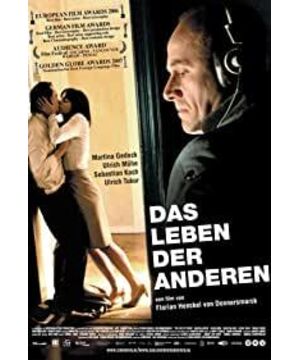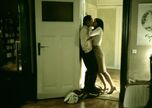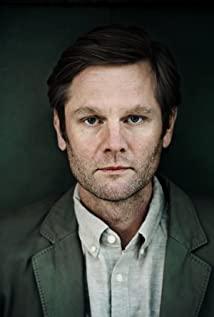"Lenin said after listening to Beethoven's Passionate Sonata,'If I keep listening to this song, the revolution will not succeed.'" After Jaska's death, Dremann played the "Dedicated to "Sonata of Good People", said to Krista. Then the camera cut into the eavesdropping room, and Wesler dropped two rows of tears. That is, from that lens, we almost foresee what will happen later. I saw the following paragraph on the Internet. —————————————————————————————— The entire communist world (the state of non-sunset) is commemorating the 25th anniversary of Lenin’s death. In Moscow, smiling Stalin and other important figures of the Communist Party were sitting at the Bolshoi Theatre to watch the ceremony... As in previous years, the whole day was a speech praising Lenin, including a radio drama about Lenin’s life. One hour. The radio play concludes with Lenin’s most admired Beethoven’s "Passion Sonata", with Lenin’s words as a narration: "There is no more beautiful music than "Passion Sonata", amazing and extraordinary music! It always makes me like a child. I am sincerely proud of how human beings can create such miraculous music." The radio play ended with the sweetest voice: "Lenin, that's such a person!" Forty-five minutes later, American radio also began to pronounce it and broadcast the American version. The life of Lenin. Beethoven’s "Enthusiasm Sonata" also rang, and Lenin’s words of love for this tune are also quoted, but this time is the full text: …make me feel proud like a childish child-how can human beings create Such miraculous music. But I can't listen to this music often, because it will affect me and make me have an urge to praise those who live in filth hell but still can create beauty, and want to touch their heads. But in this era, you can't touch someone's head unless you want your hand to be bitten off. You have to hit someone on the head—relentlessly—though in theory we are opposed to any form of violence...our task is really difficult. East Knossmark already has a story in his heart: how a Communist East German secret police monitored the private life of a famous writer. For three years, he was hiding in a monastery in Vienna and writing scripts, but before he started writing, he had spent several months interviewing East Germans who had worked as secret police and informants. "I found out," said Tonoshmark, "the secret police are a group of people who have locked their hearts and emotions. They have become principled people, and the emotional elements have been eliminated and sealed. This is actually what Lenin did. appeared: He was afraid that his feelings would ruin his pursuit of principles. A retired secret police invited East Knossmark to dinner at home. Very happy, this person told him how the East German secret police collected "smell samples" of "potential hostile forces" with the highest efficiency. There was only one mistake: there was one Woman, when the "smell" was collected, she happened to be menstruating. The secret police gave the bloody "sample" to the dog to smell it, "the dog was messed up." The former secret police who told the story just said it. Laughing. Tonoshmark sits aside drinking tea, trembling in his heart: It turns out, "completely barbaric and civilized, separated so close." __________________________________________________ Living in a filthy hell creates beauty. This is probably the most exciting film. In one of the interactions, Dreman, and Weissler are actually this kind of people. I remember that when using "Schindler's List" as a composition argument, they always come up with a very set of words, so to say : What he saved was not 1,500 Jews, but a civilization. So looking at the eavesdropping situation, he thought wickedly that what Weisler was saving was not a few artists, but the art itself. But this statement The problem is very big, because enjoying art should be human instinct. It should be said that art is fascinating. So I don’t think Wesler has the heart of the savior to hide enough to put those artists to death. Evidence. This is an uncontrolled process, and I tend to think of it as a force of primitive nature beyond the will. It turned out that "completely barbaric and civilized, so close". __________________________________________________ Living in a filthy hell creates beauty. This is probably one of the most exciting interactions in the whole film, Dreman, and Wessler are actually this kind of people. I remember that when using "Schindler's List" as a composition argument, he would always come up with a set of remarks, which is like this: What he saved was not 1,500 Jews, but a civilization. So looking at the eavesdropping situation, I thought wickedly that what Weisler was saving was not a few artists, but the art itself. But this argument is very problematic, because the enjoyment of art should be human instinct, and it should be said that art is fascinating by nature. So I don't think that Wessler is concealing evidence that is enough to put those artists to death with the heart of the savior. This is an uncontrolled process, and I tend to think of it as a force of primitive nature beyond the will. It turned out that "completely barbaric and civilized, so close". __________________________________________________ Living in a filthy hell creates beauty. This is probably one of the most exciting interactions in the whole film, Dreman, and Wessler are actually this kind of people. I remember that when using "Schindler's List" as a composition argument, he would always come up with a set of remarks, which is like this: What he saved was not 1,500 Jews, but a civilization. So looking at the eavesdropping situation, I thought wickedly that what Weisler was saving was not a few artists, but the art itself. But this argument is very problematic, because the enjoyment of art should be human instinct, and it should be said that art is fascinating by nature. So I don't think that Wessler is concealing evidence that is enough to put those artists to death with the heart of the savior. This is an uncontrolled process, and I tend to think of it as a force of primitive nature beyond the will.
Surveillance was something he spent 20 years studying, but just a few minutes after listening to the Sonata for the Good Man, his destiny had been reversed. So he began to read those poems of Yingying and Baiyun Liushui, inviting prostitutes to come and do a series of things that a Captain shouldn't do. That feeling is like making up a very important compulsory course that he has missed in the twenty years of studying surveillance and execution of interrogation. What impressed me deeply about this movie is not only that human nature itself is shining, but also that it restored to the audience a Germany that was still gloomy, gloomy and withered 30 years after the end of World War II. The war has passed, but the internal suspicion and suspicion have not ended. Those interrogations and methods are frightening. The only trace of ecstasy we felt came from the good news of the Berlin Wall being overthrown in the earphones and the crazy excitement of people shouting.
It was Minister Hamp’s last conversation with Dreman that it was thought-provoking: I heard that you have not engaged in any creative work since the Berlin Wall was demolished. What good is it if the Berlin Wall is demolished? There is no belief to follow and no resistance to resist. It’s better to go back to the small republic before. A good sentence, "There is no belief to follow, no goal to resist." This seems to be the post-art career of the once brilliant artists. The so-called post-art career, I mean the artists who have been in the post-war period. Artistic performance after a major turning point. The catastrophes of the times are painful, but they have also created great classics. However, in a relatively peaceful and civilized environment, how we go from "good" to "better" seems to be a more confusing problem. What's more, this "good" is just a matter of relativity in the past. Both the U.S. and China preach people’s democracy, but social surveys in both the U.S. and China have said: chanting democracy and giving the people full freedom of expression, but by various means to restrict the freedom of dissemination of these speeches, in essence, This is still a certain degree of anti-democracy. So the second great ingenuity of the structure of the eavesdropping storm is that the light of human nature flashes twice strongly. Let Dreman discover all the truth, let Dreman understand and see HGWXX/7, and most importantly, let him find the motivation to create again. We finally see where the image of art has been fixed after the storm. Although it is still a retrospective, it is undoubtedly positive. There is also a set of contradictions between Wessler and Krista that I remember deeply. Ever since they met for the first time and Wesler said what he wanted to say, Krista knew that this person knew him and was not malicious. And when Krista was questioned, when Wessler used the name "audience" to seduce Krista's inner artistic desires over and over again, wouldn't Wessler understand that, if Krista will be in the future Still able to be on stage, then the woman on that stage will never be Krista again. Don’t Krista know it, but in her mind, it’s better to do things that she doesn’t like to be on stage than not on stage, because not on stage means the most serious exploitation of artists, identity, social status, and self-esteem. ,Belief. Of course Wesler didn't want to interrogate, but he had to do it. He definitely didn't want the woman in front of him to give the answer he wanted so decisively and simply, but he had to get the answer. In this questioning, both Wessler and Krista lost their precious moral bottom line. It is precisely because of this that there will be self-salvation for the next two people. Wesler removed the printer, and Krista chose to die in front of the oncoming truck. What has everyone betrayed, and what is everyone making up for? This silent action and temperature is really breathtaking. Life is like this. There is betrayal but there is never absolute betrayal. There are sins, but one day they will be able to withstand these sins with peace of mind and live while completing self-salvation. After all, these people are all human beings, and they are all good people. Is the ending okay? ——Sir, would you like to wrap up your book and give it to a friend? ——No. It's for me. HGWXX/7. I will remember you.
View more about The Lives of Others reviews











